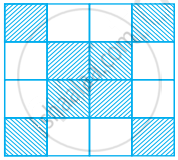Advertisements
Advertisements
प्रश्न
If p + r = 2q and `(1)/q + (1)/s = (2)/r`, then prove that p : q = r : s.
उत्तर
`(1)/q + (1)/s = (2)/r`
⇒ `(s + q)/(qs) = (2)/r`
⇒ 2qs = r(s + q)
⇒ (p + r)s = r(s + q)
⇒ ps + rs = rs + rq
⇒ ps = rq
⇒ `p/q = r/s`.
Hence proved.
APPEARS IN
संबंधित प्रश्न
By increasing the cost of entry ticket to a fair in the ratio 10 : 13, the number of visitors to the fair has decreased in the ratio 6 : 5. In what ratio has the total collection increased or decreased?
Find the compound ratio of 2 : 3, 9 : 14 and 14 : 27
If 4x + 4 : 9x – 10 is the triplicate ratio of 4 : 5, find x.
If (3x-4) : (2x+5) is the duplicate ratio of 3 : 4 , find x.
A sum of money Is divided in the ratio 2 : 3. If the larger portion is Rs 7,47,300. find the sum distributed.
Show that the value of x is 11, when `("x"^3 + "3x")/(3"x"^2 + 1) = 341/91`
The costs of the two articles are in the ratio 7 : 4. If the cost of the first article is Rs. 2,800; find the cost of the second article.
Find the ratio of:
90 cm to 1.05 m
The ratio of ₹ 1 to 20 paise is _______________
In figure, find the ratio of the area of the shaded portion to that of the whole figure:
